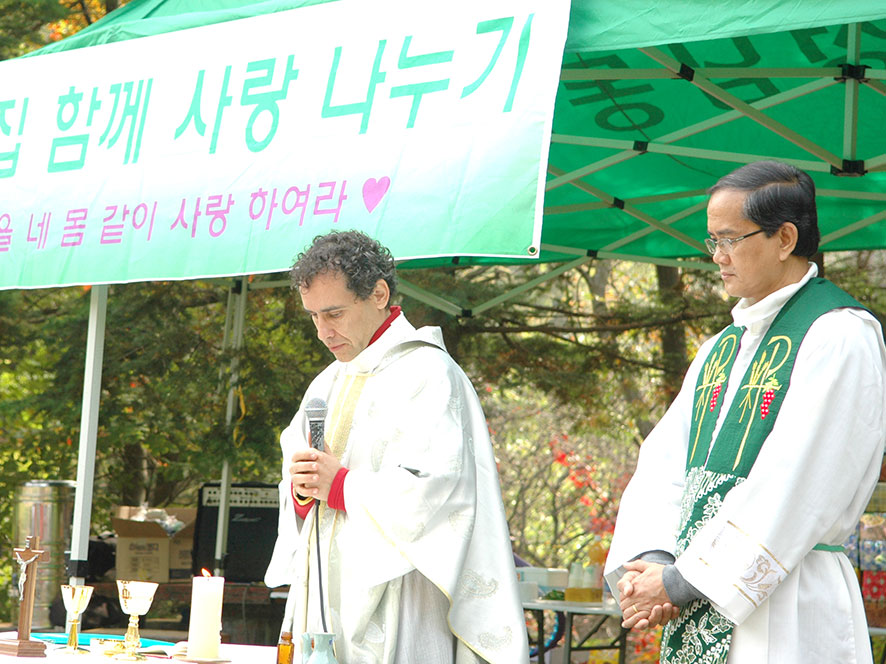Throughout the whole year 2024, my articles will deal with the Works of Mercy, which, as the Catechism of the Catholic Church says in number 2447, are “Charitable actions by which we come to the aid of our neighbors in their spiritual and bodily necessities.” I hope that through what I will present, I will help the readers open up their minds and hearts to the merciful God, and become merciful towards their neighbors and to themselves as well. Naturally, I feel that before reflecting upon the Works of Mercy, it is necessary for us to consider God as the primary source of mercy.
My attraction towards God as the source of mercy started growing in a way that was very beneficial to me when I was a young man in formation to become a Comboni Missionary. One day, on a Sunday, I was taking part in a Eucharistic Celebration. The celebrant proclaimed the opening prayer and said with a loud voice: “Father, you show your almighty power above all in your mercy and forgiveness. Continue to fill us with your gifts of love. Help us to hurry toward the eternal life you promise and come to share in the joys of your kingdom”.
MERCY AND FORGIVENESS
I have never forgotten the tone of his beautiful voice with which he stressed, “above all in your mercy and forgiveness”. Another occasion that struck me refers to the declaration of the year 2016 as a Jubilee Year of Mercy by Pope Francis. He, who has had mercy always in his heart, has proclaimed with the enthusiasm of faith that “the name of God is Mercy,” and that the most important message of Christ Jesus is the message proclaiming God’s infinite Mercy.
Many other proclamations have come from the lips and the heart of Pope Francis. I quote some: “Mercy is the identity card of God”; “God’s Mercy is profoundly linked to his fidelity”; “To the priests who hear confessions, I say: to the persons who come to you, say first of all that God loves them, show tenderness to them, never reject them.” We could have an anthology of thousands of pages containing highly qualified sayings of Pope Francis regarding God’s Mercy. Naturally, there are already several documents signed by Pope Francis,
HOLY SCRIPTURE
We will return to Pope Francis soon, but now, let us go to Holy Scripture. God the Father is constantly present as the Father rich in Mercy. In Genesis, we see that, following the first betrayal of His love, God did not abandon humanity but kept speaking to it in love. Immediately, He offered a plan of salvation, which was accomplished in Christ not for the benefit of some but for the whole of humanity.
God’s Mercy is always active in forgiving, rehabilitating, healing, and strengthening the person and offering new opportunities. Let us listen to this invitation through the words of Isaiah: “Come now, let us argue it out, says the Lord: though your sins are like scarlet, they shall be like snow; though they are red like crimson, they shall become like wool” (Isaiah 1:18).
NEW TESTAMENT
In the New Testament, the Trinity is revealed: the Father rich in Mercy, the only begotten Son, Who is the incarnation of the Father’s merciful love, the Spirit Who is the energy of God’s merciful love operating at all times and everywhere. The Gospel of Luke is known as the “Gospel of the tenderness and mercy of God.”
In chapter 15, the evangelist gives us three parables that are poetic masterpieces. These are the parable of the lost sheep presenting God on the move searching for it, the parable of the lost coin in which God lights a lamp and cleans the house to make an accurate search for it, and the parable of the merciful father, namely God Who shows His “irrational” love towards the son.
It is “irrational” in the sense that it is beyond all dreams, expectations, and human evaluations. In Luke, chapter 23, we find the episode of the thief forgiven by Jesus with the promise of paradise. Naturally, if we consider the New Testament, many passages deal with God’s Mercy. We see Christ Jesus, Who gives it flesh, and the Holy Spirit, Who brings us closer and closer to Jesus.
What we have seen about God’s love and mercy is a great challenge for us to open up to God as we depend on His constant love and tender mercy and to be grateful to Jesus, Who is patient with us and invites us to go to Him Who gives us the rest we need.




















